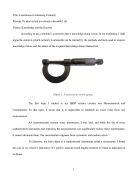Carter Els
Mr. Fum/Theory of Knowledge P.2
How achievable is certainty for knowledge?
10 October 2011
Word count=545
“How achievable is certainty for knowledge? Does this vary by area of knowledge? What in the procedures by which expert knowers generate, justify, or test claims of knowledge within their area of knowledge determines the degree of certainty that is possible and thus required? Discuss this with reference to at least two areas of knowledge that, between them, represent the range of acceptable degrees of certainty across areas of knowledge.”
Certainty is when something is true beyond reasonable doubt; it is what distinguishes knowledge from mere belief. In each area of knowledge, certainty is essential in establishing that subject, however, the degree of certainty varies depending on the area of knowledge and on how information about this area is justified. For each area of knowledge, the experts are the judges of how achievable certainty is for it and they use different means to justify that assertion. Experts in the areas of ethics and the arts rely on judgment in order to decide things such as whether a piece of art is a masterpiece or whether or not lying is wrong. These areas of knowledge can be compared to others such as mathematics and natural sciences, since in these areas experts can justify their certainty through the use of pure deduction, induction and the scientific method; this is why mathematics and natural sciences are regarded with a much higher degree of certainty than the arts and ethics. Therefore, differences in the achievability of certainty vary depending on each area of knowledge and on how each area of knowledge justifies their knowledge claims.







